Resume
Chiropractor Cover Letter Examples

May 29, 2025
|
12 min read
Craft a tailored chiropractor cover letter that aligns your skills with the role you’re "adjusting" to obtain. Learn step-by-step how to connect with employers and stand out in your job application.
4.70 Average rating
Rated by 348 people
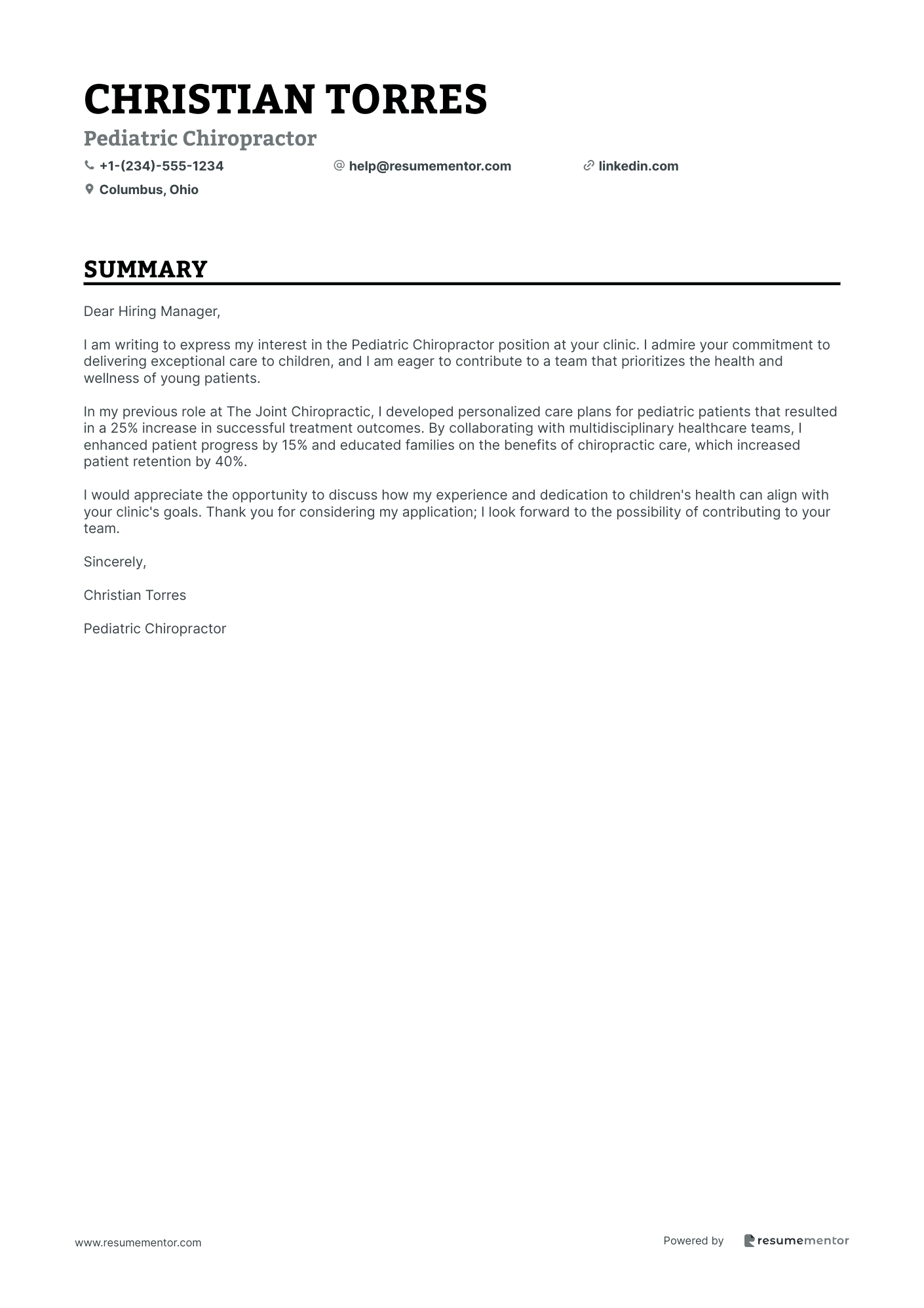
Pediatric Chiropractor
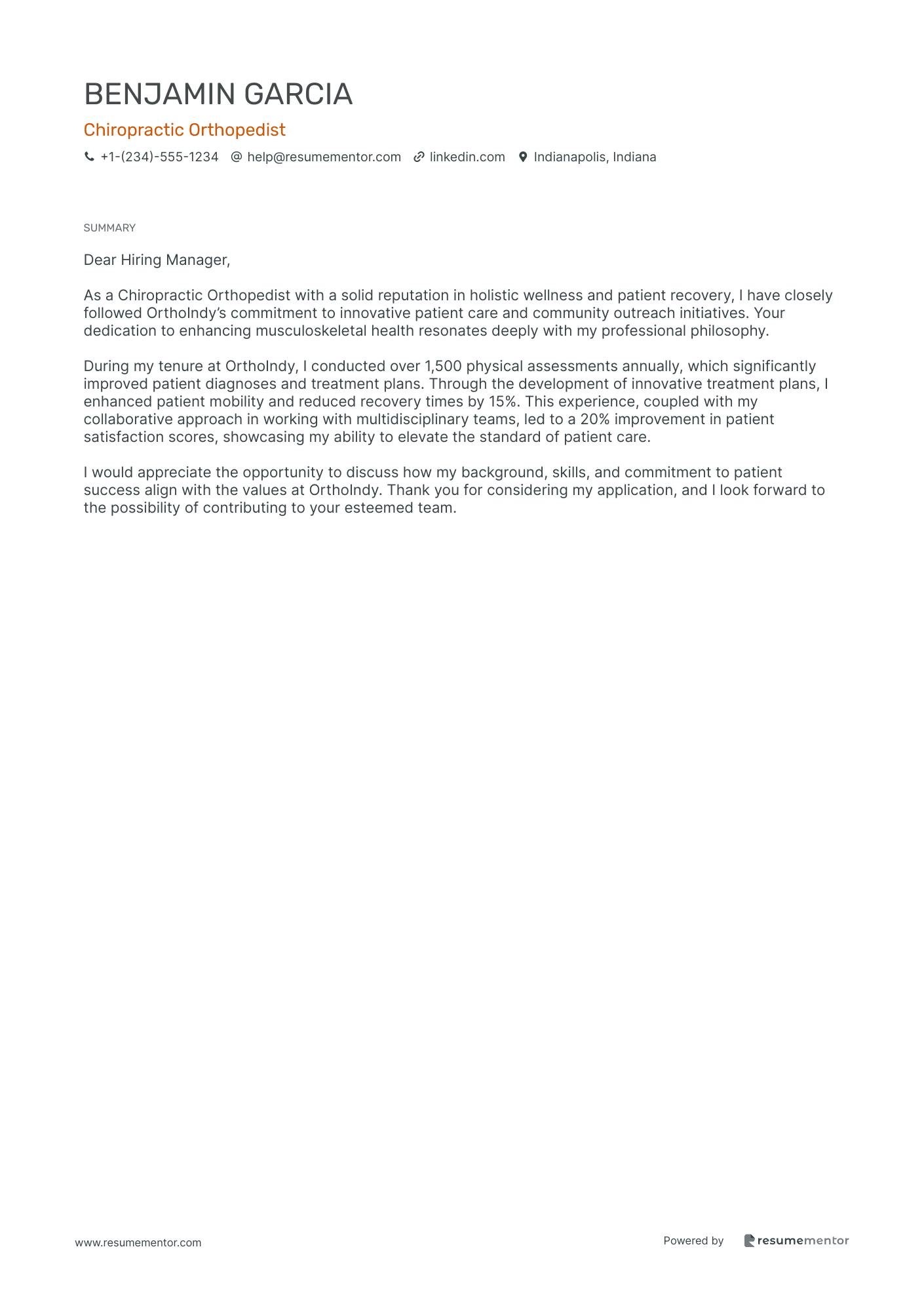
Chiropractic Orthopedist
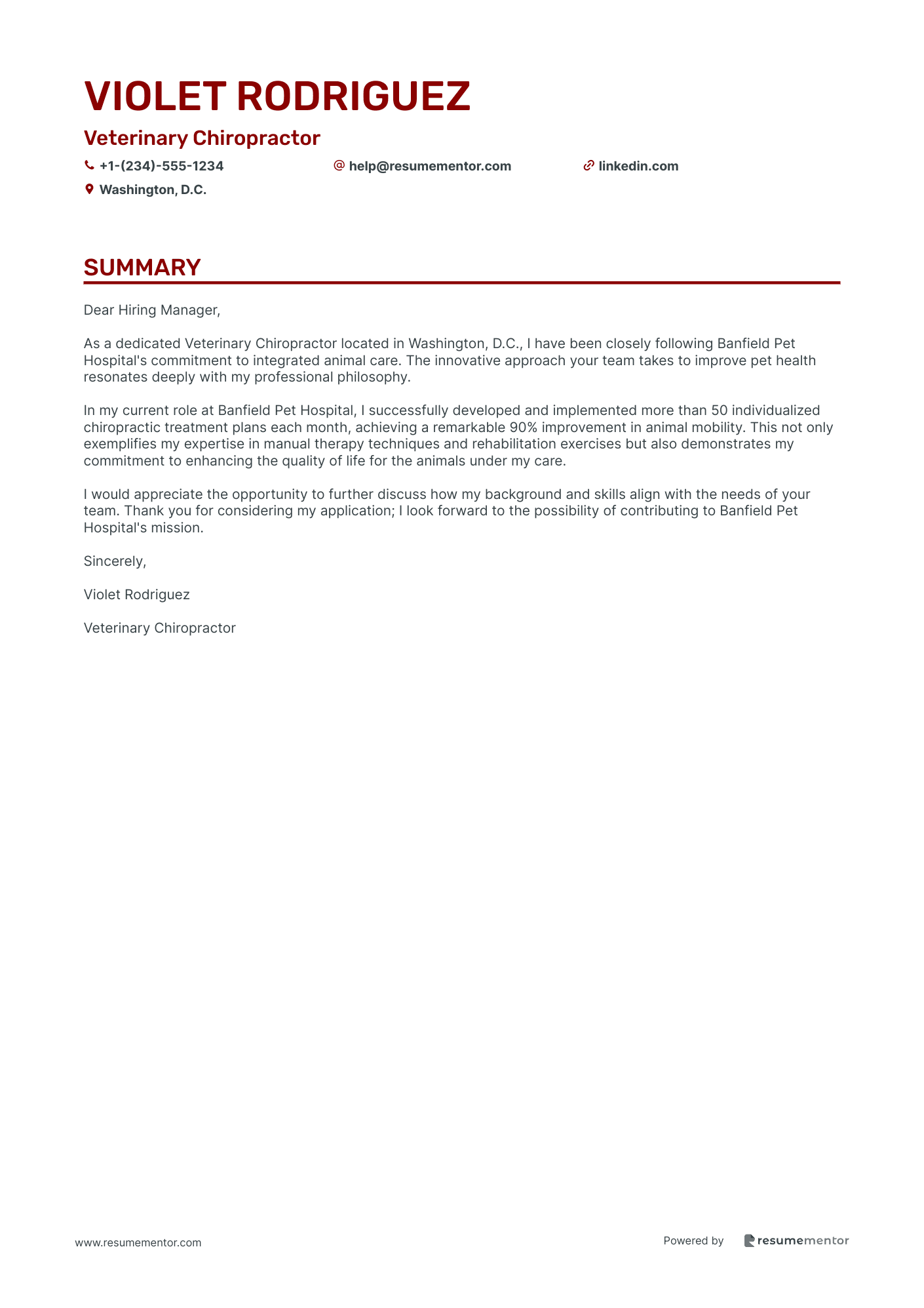
Veterinary Chiropractor
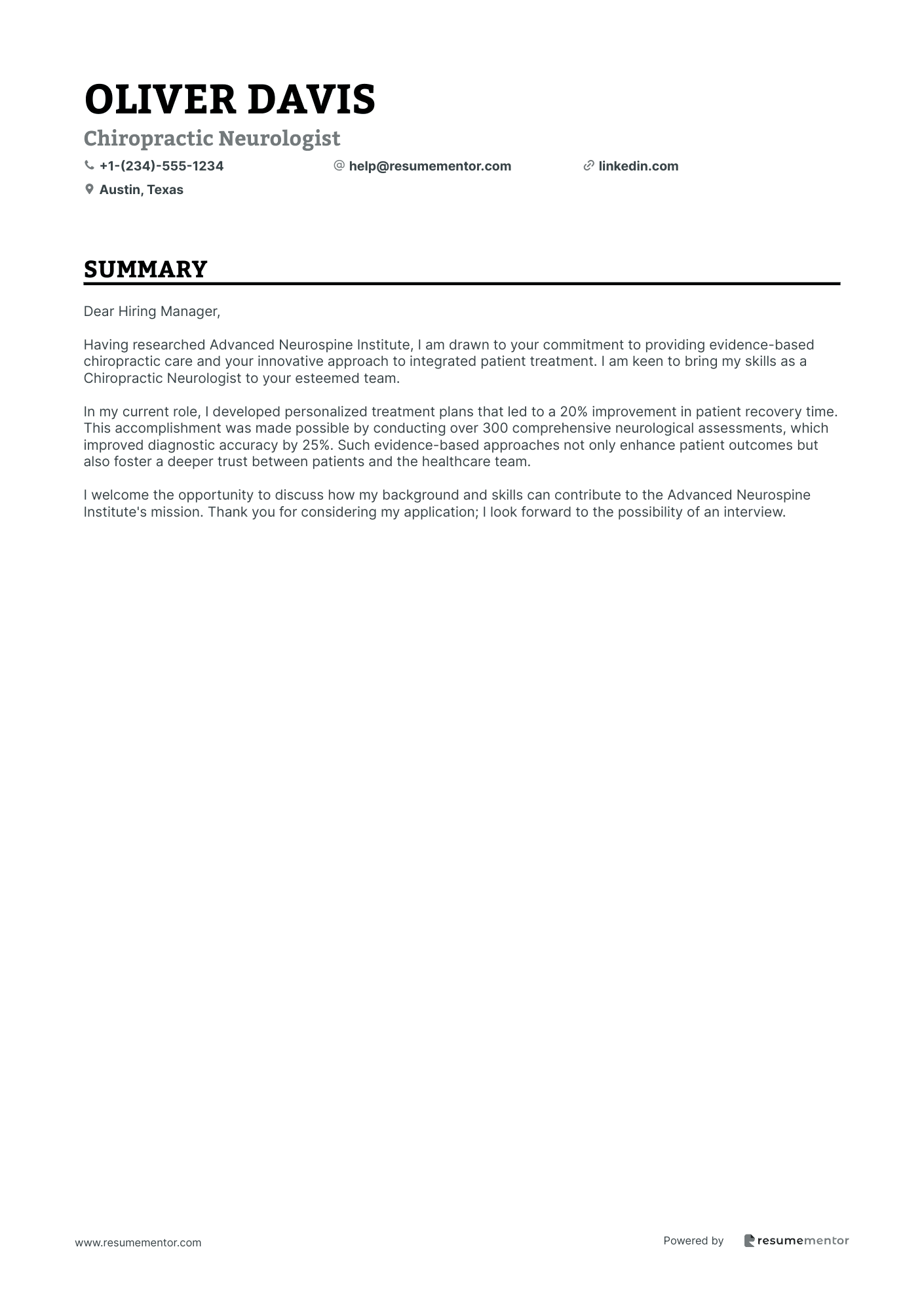
Chiropractic Neurologist
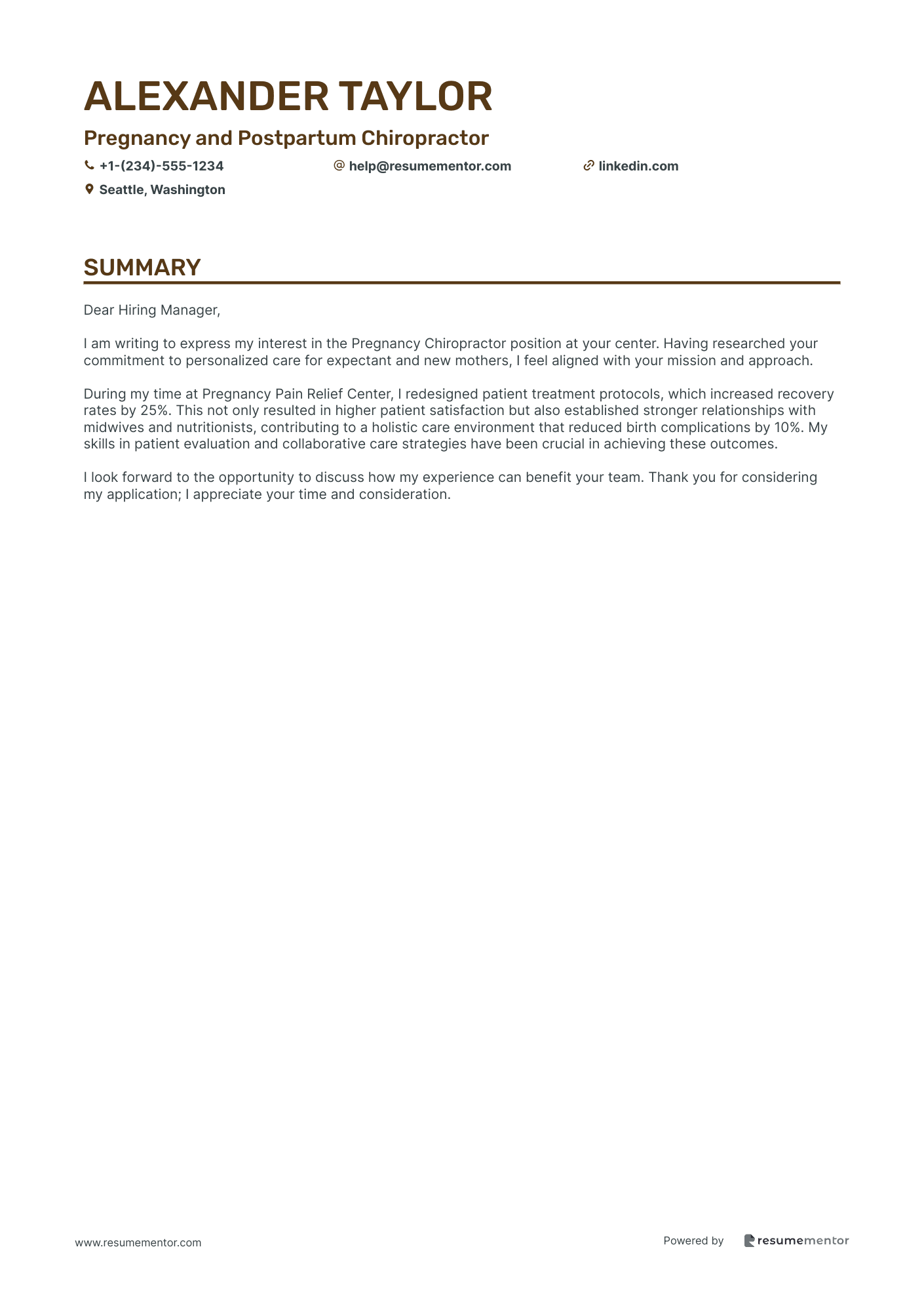
Pregnancy and Postpartum Chiropractor
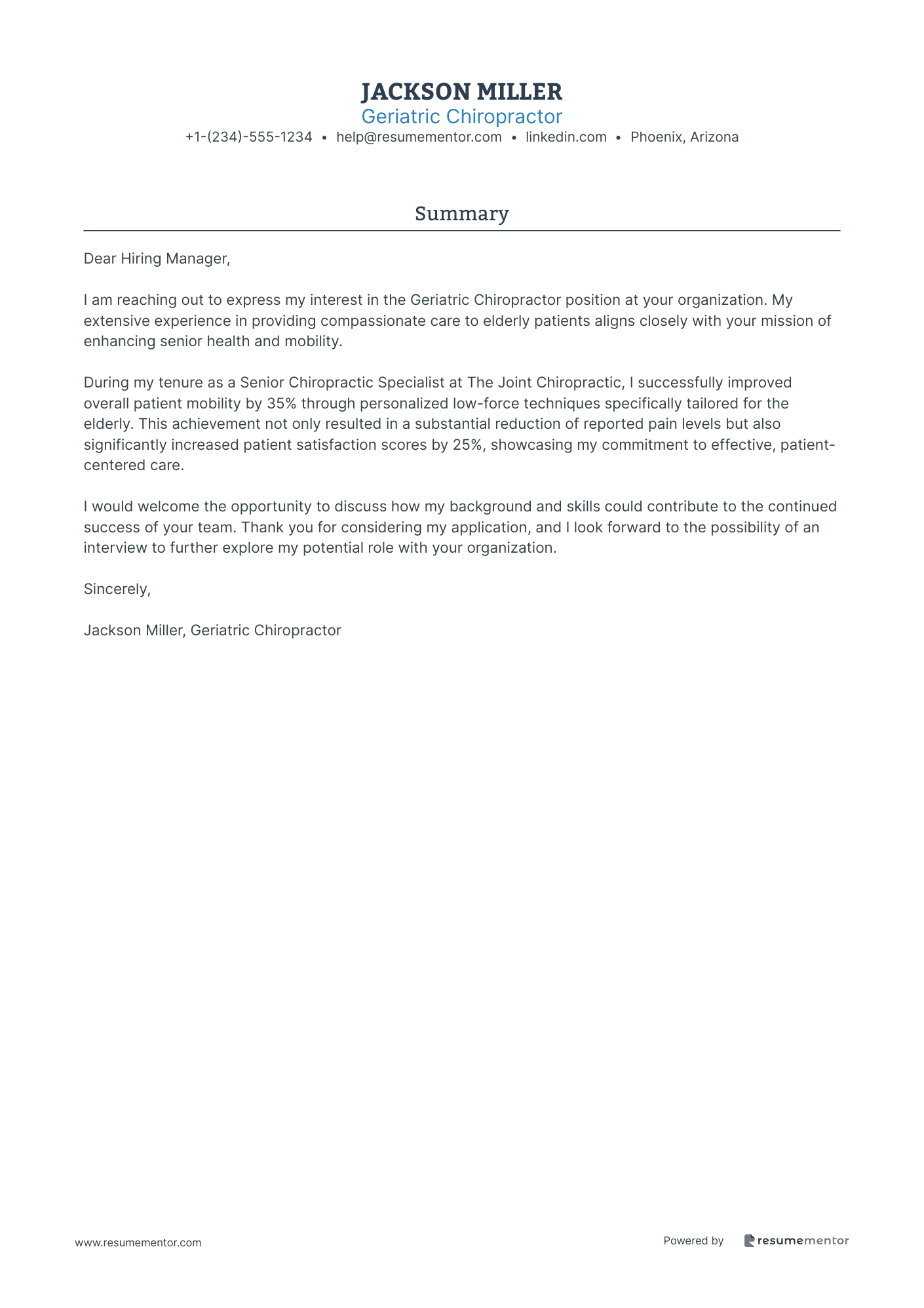
Geriatric Chiropractor
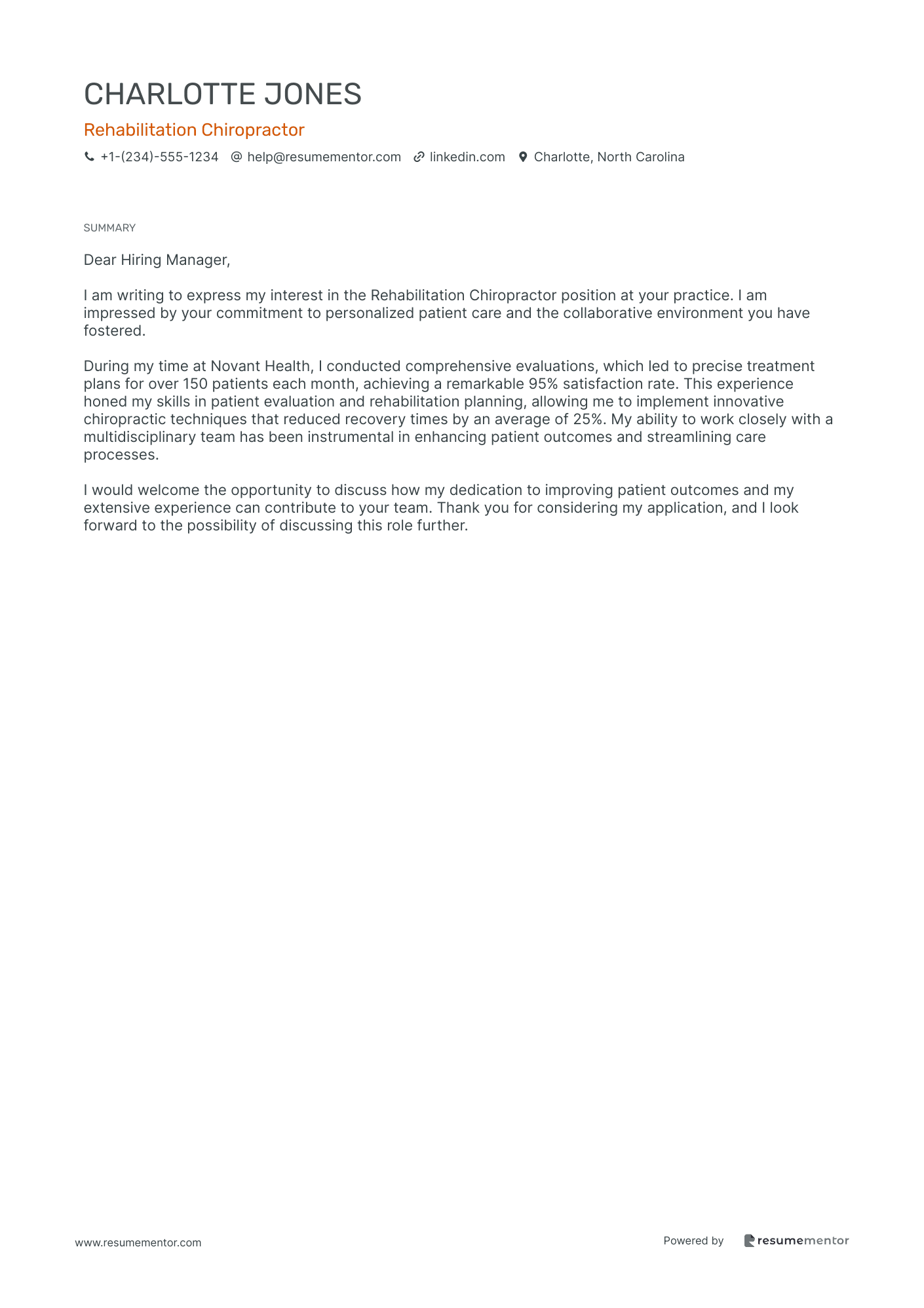
Rehabilitation Chiropractor
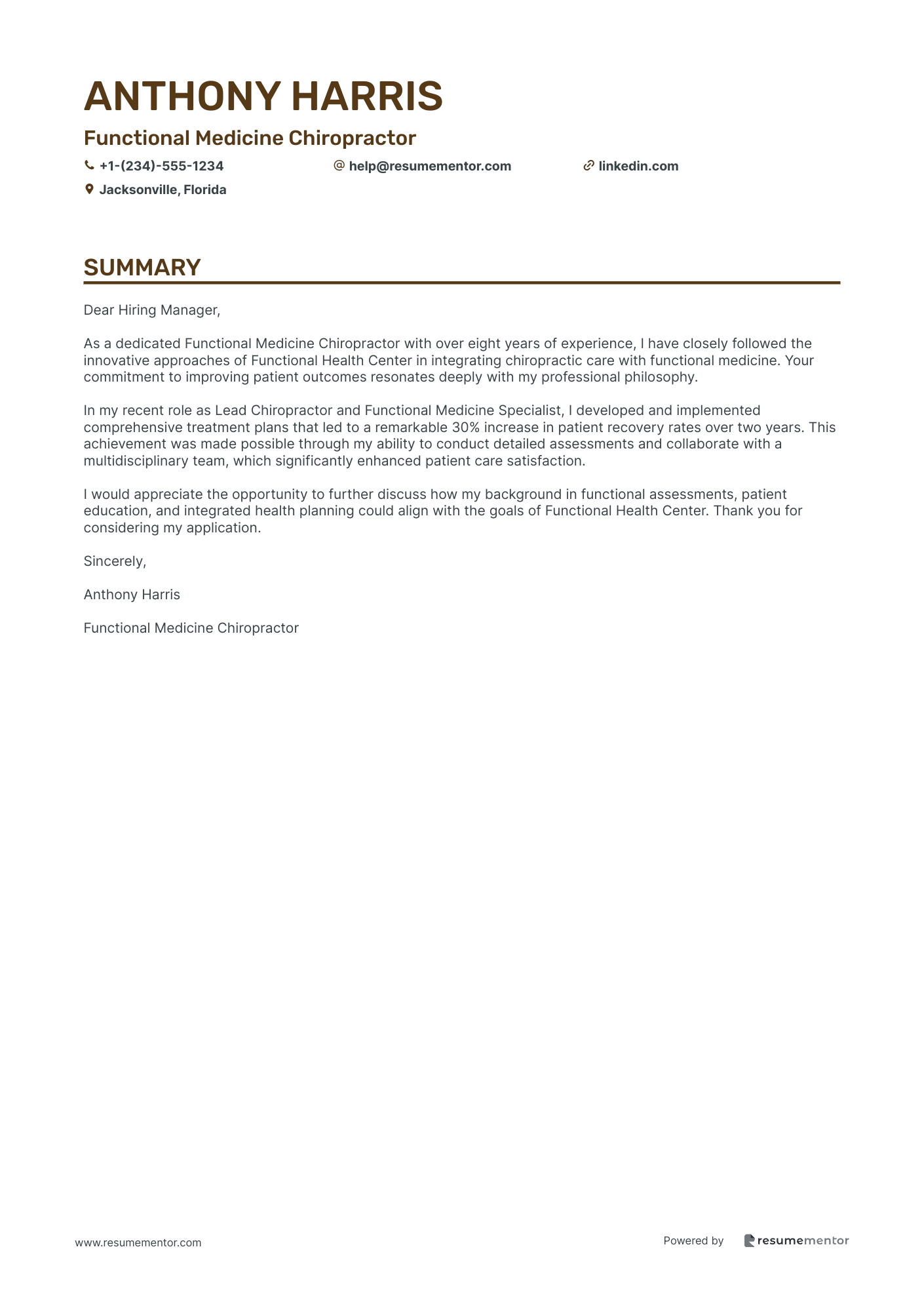
Functional Medicine Chiropractor
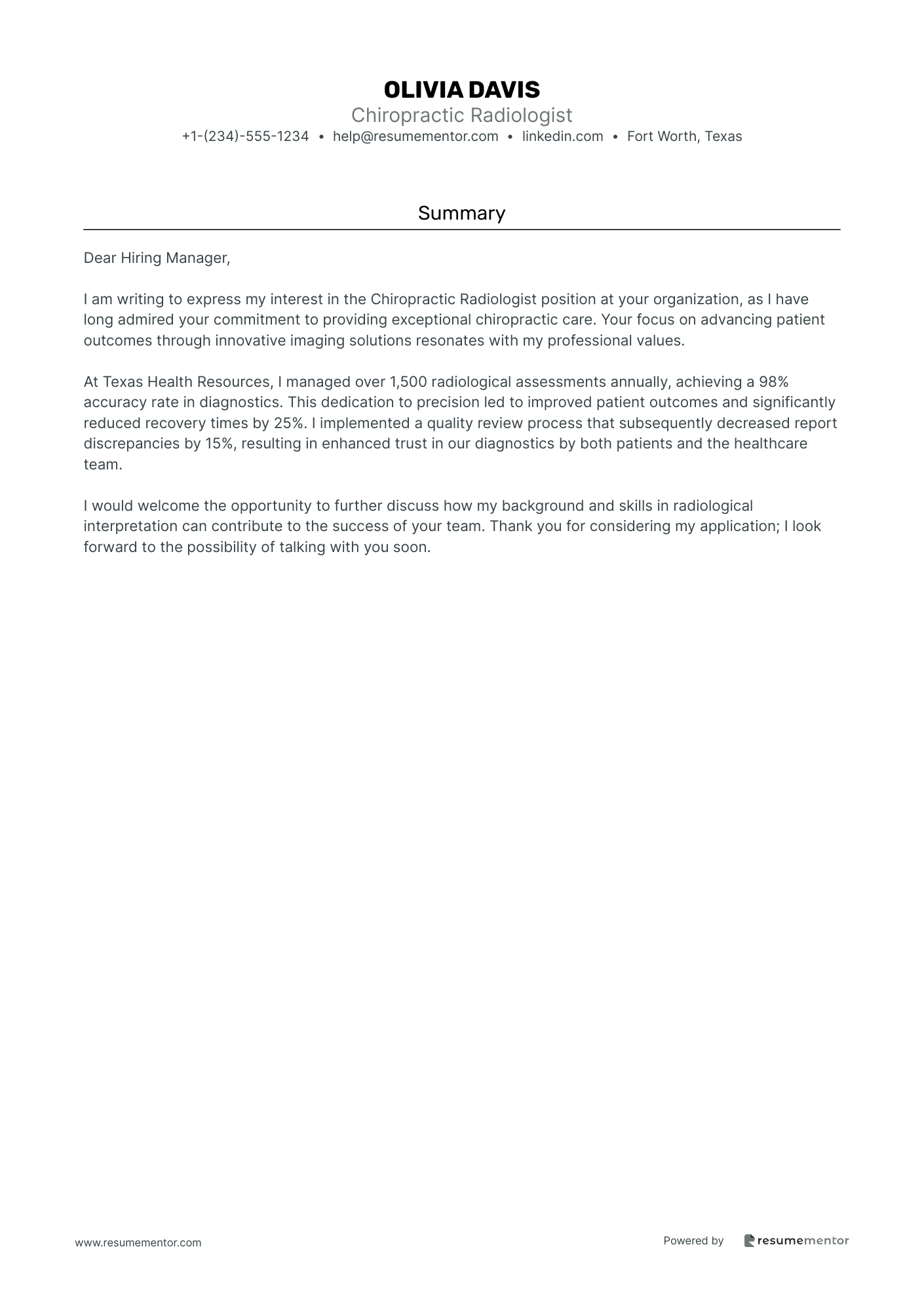
Chiropractic Radiologist
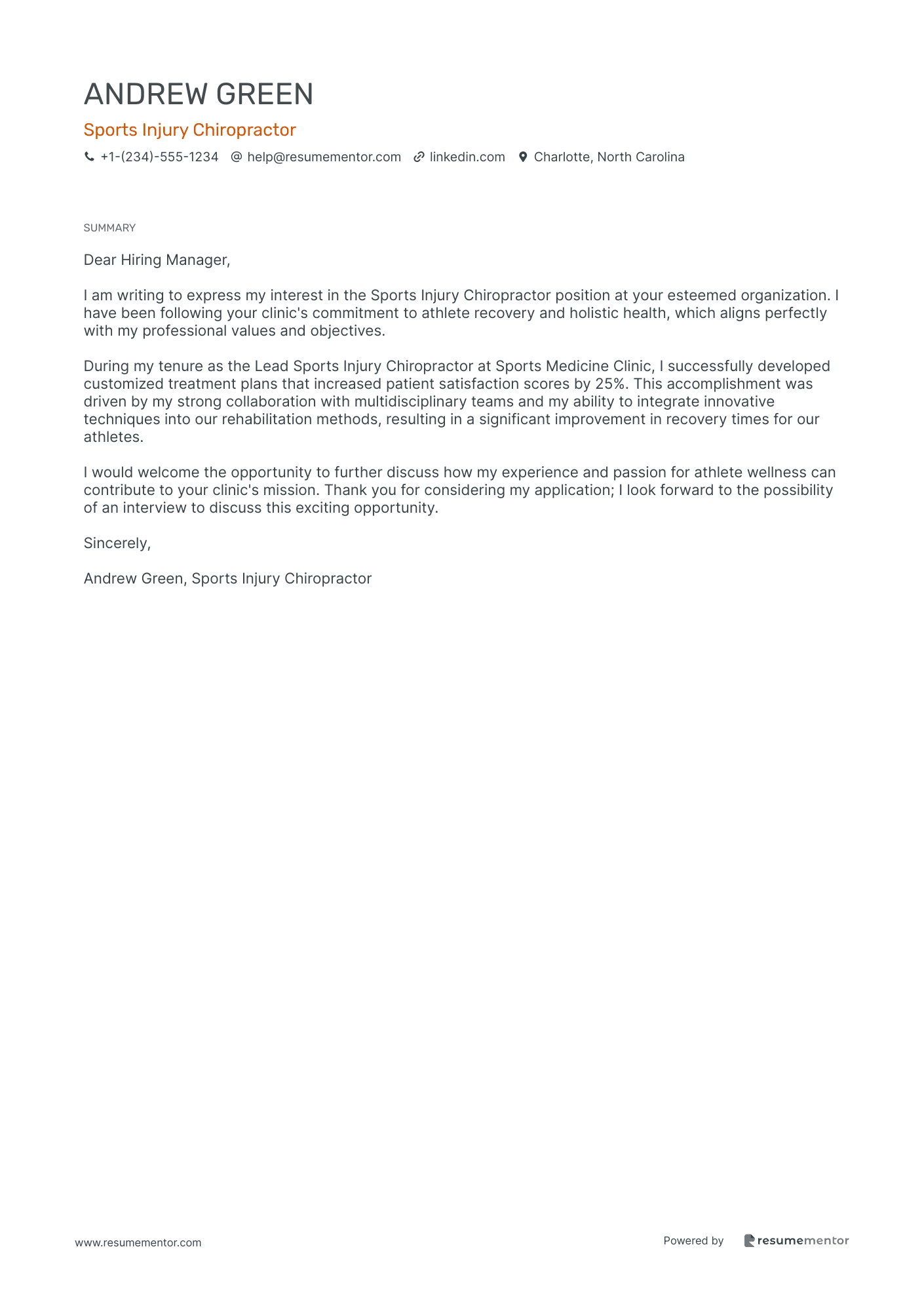
Sports Injury Chiropractor

Pediatric Chiropractor cover letter sample
When applying for this role, emphasize your experience working with children and any specialized training in pediatric care. Highlight your hands-on skills in gentle adjustments and techniques tailored for young patients. It's essential to show your understanding of child development and how chiropractic care can support it. Include any workshops or certifications, such as pediatric chiropractic courses. Provide examples of successful treatments or patient outcomes to demonstrate your effectiveness. Use the 'skill-action-result' format to clearly articulate your contributions to the health and well-being of young patients.
Christian Torres
Pediatric Chiropractor
Summary
Dear Hiring Manager,
I am writing to express my interest in the Pediatric Chiropractor position at your clinic. I admire your commitment to delivering exceptional care to children, and I am eager to contribute to a team that prioritizes the health and wellness of young patients.
In my previous role at The Joint Chiropractic, I developed personalized care plans for pediatric patients that resulted in a 25% increase in successful treatment outcomes. By collaborating with multidisciplinary healthcare teams, I enhanced patient progress by 15% and educated families on the benefits of chiropractic care, which increased patient retention by 40%.
I would appreciate the opportunity to discuss how my experience and dedication to children's health can align with your clinic's goals. Thank you for considering my application; I look forward to the possibility of contributing to your team.
Sincerely,
Christian Torres
Pediatric Chiropractor
Chiropractic Orthopedist cover letter sample
When crafting your cover letter, highlight any relevant clinical experience and internships in rehabilitation or musculoskeletal care. Stress your familiarity with diagnostic imaging and treatment modalities, as these are essential for effective patient management. If you have pursued additional training or certifications in areas like sports medicine or pain management, be sure to include these. Use clear examples to illustrate how your interventions have improved patient outcomes, following a 'skill-action-result' format to show your impact on patient recovery and satisfaction.
Benjamin Garcia
Chiropractic Orthopedist
Summary
Dear Hiring Manager,
As a Chiropractic Orthopedist with a solid reputation in holistic wellness and patient recovery, I have closely followed OrthoIndy’s commitment to innovative patient care and community outreach initiatives. Your dedication to enhancing musculoskeletal health resonates deeply with my professional philosophy.
During my tenure at OrthoIndy, I conducted over 1,500 physical assessments annually, which significantly improved patient diagnoses and treatment plans. Through the development of innovative treatment plans, I enhanced patient mobility and reduced recovery times by 15%. This experience, coupled with my collaborative approach in working with multidisciplinary teams, led to a 20% improvement in patient satisfaction scores, showcasing my ability to elevate the standard of patient care.
I would appreciate the opportunity to discuss how my background, skills, and commitment to patient success align with the values at OrthoIndy. Thank you for considering my application, and I look forward to the possibility of contributing to your esteemed team.
Veterinary Chiropractor cover letter sample
When applying for this role, it's important to showcase your experience in animal care and any specialized training in chiropractic techniques for animals. Highlight your understanding of animal anatomy and physiology. Provide examples of how you've successfully treated animals, focusing on specific cases where your interventions led to improved mobility or pain relief. Mention any workshops or certifications you've completed, such as animal chiropractic courses. Include how your passion for animal welfare drives your practice, as this adds depth to your application and demonstrates commitment.
Violet Rodriguez
Veterinary Chiropractor
Summary
Dear Hiring Manager,
As a dedicated Veterinary Chiropractor located in Washington, D.C., I have been closely following Banfield Pet Hospital's commitment to integrated animal care. The innovative approach your team takes to improve pet health resonates deeply with my professional philosophy.
In my current role at Banfield Pet Hospital, I successfully developed and implemented more than 50 individualized chiropractic treatment plans each month, achieving a remarkable 90% improvement in animal mobility. This not only exemplifies my expertise in manual therapy techniques and rehabilitation exercises but also demonstrates my commitment to enhancing the quality of life for the animals under my care.
I would appreciate the opportunity to further discuss how my background and skills align with the needs of your team. Thank you for considering my application; I look forward to the possibility of contributing to Banfield Pet Hospital's mission.
Sincerely,
Violet Rodriguez
Veterinary Chiropractor
Chiropractic Neurologist cover letter sample
When applying for this role, it’s important to highlight your experience with neurological assessments and treatment plans. Mention any specialized training or certification in functional neurology or neuro-rehabilitation you have completed. Use specific examples of how your interventions improved patient outcomes, focusing on a 'skill-action-result' framework. Emphasize your ability to collaborate with a multidisciplinary team and communicate complex information clearly to patients. Mention any continuing education courses you’ve taken to stay current with advancements in the field to demonstrate your commitment to professional growth.
Summary
Dear Hiring Manager,
Having researched Advanced Neurospine Institute, I am drawn to your commitment to providing evidence-based chiropractic care and your innovative approach to integrated patient treatment. I am keen to bring my skills as a Chiropractic Neurologist to your esteemed team.
In my current role, I developed personalized treatment plans that led to a 20% improvement in patient recovery time. This accomplishment was made possible by conducting over 300 comprehensive neurological assessments, which improved diagnostic accuracy by 25%. Such evidence-based approaches not only enhance patient outcomes but also foster a deeper trust between patients and the healthcare team.
I welcome the opportunity to discuss how my background and skills can contribute to the Advanced Neurospine Institute's mission. Thank you for considering my application; I look forward to the possibility of an interview.
Pregnancy and Postpartum Chiropractor cover letter sample
When crafting your cover letter, emphasize any specialized training in prenatal and postpartum care. Highlight relevant certifications, such as those in Webster Technique or specific maternal care chiropractic courses, to demonstrate your expertise. Mention your hands-on experience working with pregnant clients, detailing the methods you used to alleviate discomfort and improve their overall well-being. Share testimonials or case studies that showcase positive outcomes, following a 'skill-action-result' approach, to illustrate how your care has positively impacted patients’ experiences during this critical time.
Alexander Taylor
Pregnancy and Postpartum Chiropractor
Summary
Dear Hiring Manager,
I am writing to express my interest in the Pregnancy Chiropractor position at your center. Having researched your commitment to personalized care for expectant and new mothers, I feel aligned with your mission and approach.
During my time at Pregnancy Pain Relief Center, I redesigned patient treatment protocols, which increased recovery rates by 25%. This not only resulted in higher patient satisfaction but also established stronger relationships with midwives and nutritionists, contributing to a holistic care environment that reduced birth complications by 10%. My skills in patient evaluation and collaborative care strategies have been crucial in achieving these outcomes.
I look forward to the opportunity to discuss how my experience can benefit your team. Thank you for considering my application; I appreciate your time and consideration.
Geriatric Chiropractor cover letter sample
When applying for this role, emphasize any experience working with elderly patients. Highlight your knowledge of age-related conditions and the specific chiropractic techniques you’ve mastered for senior health. It’s important to mention any relevant certifications, such as geriatric care or specialty training. Also, provide examples of how you've effectively communicated treatment plans to patients and their families. Demonstrate how your approach has led to improved mobility and quality of life for your patients using a 'skill-action-result' framework to clearly illustrate your impact.
Jackson Miller
Geriatric Chiropractor
Summary
Dear Hiring Manager,
I am reaching out to express my interest in the Geriatric Chiropractor position at your organization. My extensive experience in providing compassionate care to elderly patients aligns closely with your mission of enhancing senior health and mobility.
During my tenure as a Senior Chiropractic Specialist at The Joint Chiropractic, I successfully improved overall patient mobility by 35% through personalized low-force techniques specifically tailored for the elderly. This achievement not only resulted in a substantial reduction of reported pain levels but also significantly increased patient satisfaction scores by 25%, showcasing my commitment to effective, patient-centered care.
I would welcome the opportunity to discuss how my background and skills could contribute to the continued success of your team. Thank you for considering my application, and I look forward to the possibility of an interview to further explore my potential role with your organization.
Sincerely,
Jackson Miller, Geriatric Chiropractor
Rehabilitation Chiropractor cover letter sample
When crafting your cover letter, emphasize your experience in patient assessments and treatment planning. Highlight your knowledge of various chiropractic techniques, such as spinal manipulation and therapeutic exercises. If you've obtained any relevant certifications or specialized training, mention them to showcase your commitment to ongoing education. Illustrate how your interventions have improved patient outcomes, using specific metrics or feedback. Discuss your ability to build strong relationships with patients, ensuring their comfort and trust, as this is critical in developing effective treatment plans.
Charlotte Jones
Rehabilitation Chiropractor
Summary
Dear Hiring Manager,
I am writing to express my interest in the Rehabilitation Chiropractor position at your practice. I am impressed by your commitment to personalized patient care and the collaborative environment you have fostered.
During my time at Novant Health, I conducted comprehensive evaluations, which led to precise treatment plans for over 150 patients each month, achieving a remarkable 95% satisfaction rate. This experience honed my skills in patient evaluation and rehabilitation planning, allowing me to implement innovative chiropractic techniques that reduced recovery times by an average of 25%. My ability to work closely with a multidisciplinary team has been instrumental in enhancing patient outcomes and streamlining care processes.
I would welcome the opportunity to discuss how my dedication to improving patient outcomes and my extensive experience can contribute to your team. Thank you for considering my application, and I look forward to the possibility of discussing this role further.
Functional Medicine Chiropractor cover letter sample
When applying for this position, focus on any prior experience in holistic health practices or patient-focused care. Emphasize your expertise in integrating nutrition and lifestyle changes into treatment plans. Highlight certifications, such as in functional medicine or advanced chiropractic techniques, to demonstrate your qualifications. Provide details on how you have successfully improved patient outcomes through a detailed assessment and personalized care strategies. Use specific examples of how your interventions led to measurable health improvements, showcasing the positive impact you've made on patients’ lives.
Anthony Harris
Functional Medicine Chiropractor
Summary
Dear Hiring Manager,
As a dedicated Functional Medicine Chiropractor with over eight years of experience, I have closely followed the innovative approaches of Functional Health Center in integrating chiropractic care with functional medicine. Your commitment to improving patient outcomes resonates deeply with my professional philosophy.
In my recent role as Lead Chiropractor and Functional Medicine Specialist, I developed and implemented comprehensive treatment plans that led to a remarkable 30% increase in patient recovery rates over two years. This achievement was made possible through my ability to conduct detailed assessments and collaborate with a multidisciplinary team, which significantly enhanced patient care satisfaction.
I would appreciate the opportunity to further discuss how my background in functional assessments, patient education, and integrated health planning could align with the goals of Functional Health Center. Thank you for considering my application.
Sincerely,
Anthony Harris
Functional Medicine Chiropractor
Chiropractic Radiologist cover letter sample
When crafting your cover letter, emphasize your expertise in diagnostic imaging and interpretive skills. Highlight any advanced training or certifications, such as specific imaging techniques or technologies you've mastered. Mention your experience in collaborating with healthcare teams to develop treatment plans based on imaging results. Use clear examples of how your imaging skills have improved patient outcomes or accelerated diagnosis processes. Follow a result-driven structure by demonstrating how your contributions have led to increased efficiency or patient satisfaction in previous roles.
Olivia Davis
Chiropractic Radiologist
Summary
Dear Hiring Manager,
I am writing to express my interest in the Chiropractic Radiologist position at your organization, as I have long admired your commitment to providing exceptional chiropractic care. Your focus on advancing patient outcomes through innovative imaging solutions resonates with my professional values.
At Texas Health Resources, I managed over 1,500 radiological assessments annually, achieving a 98% accuracy rate in diagnostics. This dedication to precision led to improved patient outcomes and significantly reduced recovery times by 25%. I implemented a quality review process that subsequently decreased report discrepancies by 15%, resulting in enhanced trust in our diagnostics by both patients and the healthcare team.
I would welcome the opportunity to further discuss how my background and skills in radiological interpretation can contribute to the success of your team. Thank you for considering my application; I look forward to the possibility of talking with you soon.
Sports Injury Chiropractor cover letter sample
When applying for this role, it’s important to highlight any experience you have with sports-related injuries or rehabilitation. Detail your hands-on experience with athletes and any specialized training you've completed, such as courses in biomechanics or sports therapy. Emphasize your ability to develop tailored treatment plans based on individual needs. Use a 'skill-action-result' approach to showcase how your interventions have improved recovery times or performance. Additionally, mention any certifications or memberships in professional organizations relevant to this field to demonstrate your commitment and expertise.
Andrew Green
Sports Injury Chiropractor
Summary
Dear Hiring Manager,
I am writing to express my interest in the Sports Injury Chiropractor position at your esteemed organization. I have been following your clinic's commitment to athlete recovery and holistic health, which aligns perfectly with my professional values and objectives.
During my tenure as the Lead Sports Injury Chiropractor at Sports Medicine Clinic, I successfully developed customized treatment plans that increased patient satisfaction scores by 25%. This accomplishment was driven by my strong collaboration with multidisciplinary teams and my ability to integrate innovative techniques into our rehabilitation methods, resulting in a significant improvement in recovery times for our athletes.
I would welcome the opportunity to further discuss how my experience and passion for athlete wellness can contribute to your clinic's mission. Thank you for considering my application; I look forward to the possibility of an interview to discuss this exciting opportunity.
Sincerely,
Andrew Green, Sports Injury Chiropractor
Related Articles

Continue Reading
Check more recommended readings to get the job of your dreams.
Resume
Resources
Tools
© 2026. All rights reserved.
Made with love by people who care.
